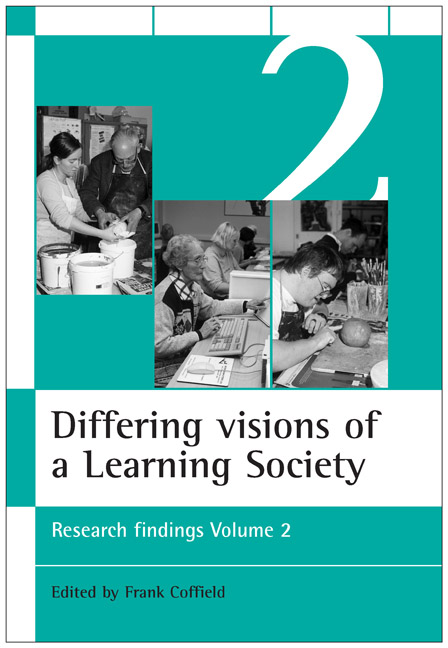Book contents
- Frontmatter
- Contents
- Notes on contributors
- Dedication
- The three stages of lifelong learning: romance, evidence and implementation
- one The meaning of the Learning Society for adults with learning difficulties: bold rhetoric and limited opportunities
- two Networks, norms and trust: explaining patterns of lifelong learning in Scotland and Northern Ireland
- three Learning culture, learning age, learning society: turning aspirations into reality?
- four Teaching and learning in higher education: issues of innovation
- five Participating in the Learning Society: history, place and biography
- six Skills in the British workplace
- Index
- The Learning Society series
one - The meaning of the Learning Society for adults with learning difficulties: bold rhetoric and limited opportunities
Published online by Cambridge University Press: 05 July 2022
- Frontmatter
- Contents
- Notes on contributors
- Dedication
- The three stages of lifelong learning: romance, evidence and implementation
- one The meaning of the Learning Society for adults with learning difficulties: bold rhetoric and limited opportunities
- two Networks, norms and trust: explaining patterns of lifelong learning in Scotland and Northern Ireland
- three Learning culture, learning age, learning society: turning aspirations into reality?
- four Teaching and learning in higher education: issues of innovation
- five Participating in the Learning Society: history, place and biography
- six Skills in the British workplace
- Index
- The Learning Society series
Summary
Background
In the ESRC's Learning Society Programme specification, the key concept of the learning society is defined as one “in which all citizens acquire a high quality general education, appropriate vocational training and a job (or series of jobs) worthy of a human being while continuing to participate in education and training throughout their lives” (Coffield, 1994). People with learning difficulties are particularly likely to experience social marginalisation and difficulty in accessing the labour market. It is therefore important to consider what opportunities the Learning Society is likely to hold for them, and to consider what can be learnt from their experiences which may be applicable to wider social groups. This was the central concern of our research. The structure of this chapter is as follows. We begin by outlining developments in a range of public policy arenas which all play a part in shaping the nature of the Learning Society for people with learning difficulties. Subsequently, we discuss findings from our interview survey which mapped lifelong learning services for people with learning difficulties in Scotland and their underpinning discourses. Finally, we discuss ethnographic case studies to explore the way in which dominant visions of the Learning Society shape the identities and lived experiences of people with learning difficulties.
Definition of learning difficulties employed in the study
Clinical definitions of learning difficulty identify approximately 4% of the population as falling into this category. The present study did not employ a medical, but rather adopted an operational definition, so that people were defined as having learning difficulties if they had been labelled in this way by service providers. Accordingly, learning difficulties included those with a background of a Record of Needs and/or special schooling, a small proportion of whom had little or no speech and had spent a significant proportion of their lives in long-stay institutions. In addition, the category included adults who had difficulty with coping skills, oracy, functional literacy and numeracy, estimated by professionals as up to one third of people in areas of social disadvantage (Riddell et al, 1998a). Young people from disadvantaged backgrounds who had missed a lot of school due to accident or illness were also categorised as having learning difficulties.
- Type
- Chapter
- Information
- Differing visions of a Learning Society Vol 2Research Findings, pp. 49 - 94Publisher: Bristol University PressPrint publication year: 2000



